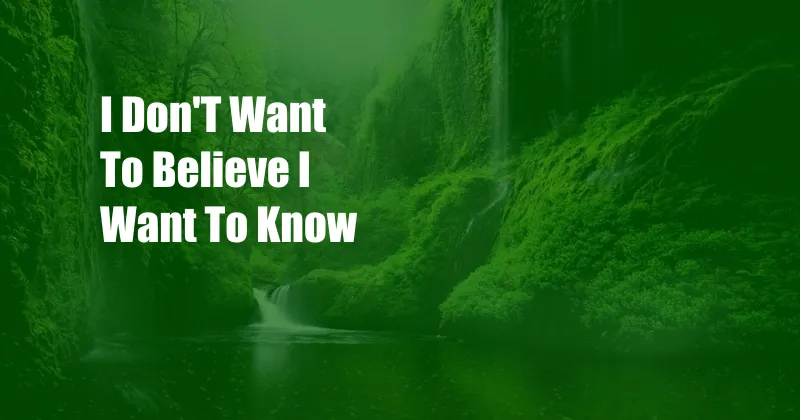
I Don’t Want to Believe, I Want to Know
As a child, I was always curious about the world around me. I wanted to know everything there was to know about history, science, and nature. But as I got older, I started to realize that there were some things that I didn’t want to believe. I didn’t want to believe that there was injustice in the world, that people could be cruel to each other, or that there was no afterlife.
But I also knew that I couldn’t just ignore these things. I had to face them head-on and try to understand them. So I started to read books, talk to people, and travel the world. And the more I learned, the more I realized that there was a lot of truth in the things I didn’t want to believe.
The Power of Doubt
The Importance of Questioning Beliefs
Doubt is a powerful thing. It can lead us to question our beliefs, our values, and our assumptions. And that can be a good thing. When we question our beliefs, we open ourselves up to the possibility of learning new things and growing as individuals.
Of course, doubt can also be uncomfortable. It can make us feel insecure and uncertain. But it’s important to remember that doubt is not a sign of weakness. It’s a sign of strength. It’s a sign that you’re willing to challenge the status quo and to seek out the truth.
The Dangers of Blind Faith
The opposite of doubt is blind faith. Blind faith is the belief in something without any evidence or reason. It’s the belief that something is true simply because someone else says it’s true.
Blind faith can be dangerous. It can lead us to believe things that aren’t true and to make decisions that are not in our best interests. It can also make us more susceptible to manipulation and exploitation.
The Importance of Evidence
When we’re trying to decide whether or not to believe something, it’s important to look at the evidence. What evidence is there to support the claim? What evidence is there to refute it?
Of course, not all evidence is created equal. Some evidence is more reliable than other evidence. When we’re evaluating evidence, we need to consider the following factors:
- The source of the evidence
- The methodology used to collect the evidence
- The quality of the evidence
The Importance of Critical Thinking
Critical thinking is the ability to think clearly and rationally about what to believe or do. It involves the ability to analyze information, identify biases, and evaluate evidence.
Critical thinking is an essential skill for anyone who wants to make informed decisions and to live a meaningful life. It allows us to question our beliefs, to challenge the status quo, and to seek out the truth.
Tips for Developing Critical Thinking Skills
Here are a few tips for developing critical thinking skills:
- Be open to new ideas and perspectives.
- Question your own beliefs and assumptions.
- Seek out information from a variety of sources.
- Evaluate evidence carefully.
- Be willing to change your mind.
FAQ
What is the difference between doubt and skepticism?
Doubt is the state of being uncertain about something. Skepticism is the attitude of questioning everything and believing nothing unless there is sufficient evidence to support it.
Why is it important to be skeptical?
Being skeptical helps us to avoid being misled by false information and to make more informed decisions.
How can I improve my critical thinking skills?
You can improve your critical thinking skills by practicing the tips listed above. You can also take a critical thinking course or workshop.
Conclusion
I believe that it is important to be open to new ideas and perspectives, to question our beliefs, and to seek out the truth. I also believe that it is important to be skeptical and to evaluate evidence carefully before making decisions.
I hope that this article has helped you to better understand the importance of doubt and the power of critical thinking. I encourage you to continue to ask questions, to challenge the status quo, and to seek out the truth.